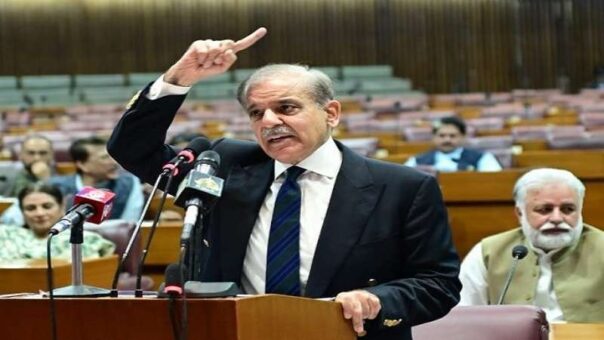Islamabad, March 3, 2024 – In his inaugural address to the National Assembly, Pakistan’s newly-elected Prime Minister, Muhammad Shehbaz Sharif, acknowledged the formidable socio-economic challenges facing the nation but expressed confidence that they were surmountable.
Emphasizing the need for collective efforts, he outlined a comprehensive vision aimed at tackling inflation, the high cost of living, the energy sector’s circular debt, and foreign debts.
Shehbaz Sharif, who secured 201 votes in the National Assembly, extended an olive branch to the opposition with a ‘charter of reconciliation’ while reiterating his commitment to a ‘charter of economy.’ Addressing the challenges head-on, he asserted that the country possesses immense natural resources and a pool of talented youth capable of steering Pakistan out of its difficulties.
Highlighting the economic landscape, the prime minister-elect outlined the financial constraints, stating that despite a budget revenue of Rs12,300 billion, the Federal Government faced a deficit of Rs700 billion after servicing interest and service charges. Shehbaz Sharif underscored the need to find resources for development, education, health, and salaries while navigating a complex web of loans.
Touching upon the energy sector, Shehbaz Sharif detailed the circular debt issues, revealing that the power sector alone bore a burden of Rs2300 billion, with a circular debt of Rs2900 billion in the gas sector. He described these challenges as a “thorny journey” but expressed determination to overcome them, drawing parallels with the success stories of developed nations.
The newly-elected prime minister outlined key areas of focus for his government, including a network of health and educational facilities, a green revolution, and infrastructure and factory construction. He pledged to utilize the latest technology, empower women, and provide loan facilities to the youth to bring positive changes within a year.
Shehbaz Sharif announced initiatives such as providing scholarships to high-achieving students, boosting artificial intelligence and IT exports, and launching a solar tube-wells program for smaller farmers. He underscored the importance of a robust public transport network, education for children of martyred prisoners, and the implementation of the National Action Plan to combat terrorism.
Addressing foreign policy, Shehbaz Sharif committed to steering clear of any ‘grey games’ and focusing on increasing friendly relations globally. He expressed gratitude to countries such as Saudi Arabia, UAE, Turkiye, and Qatar for their support and pledged to strengthen ties with the US, EU, Gulf, and neighboring nations.
The prime minister-elect urged unity in condemning human rights violations in Gaza and Indian Illegally Occupied Jammu & Kashmir (IIOJK). He emphasized the need for action on climate change, distribution of funds among affected regions, and a transition to solar power to combat the challenges posed by the oil mafia.
On the issue of the PTI leadership’s letter to the IMF, Shehbaz Sharif criticized it as showing enmity with the country, calling for constitutional remedies for election disputes instead. He invited the opposition to collaborate on polls system reforms, recalling past cooperation on national issues.
In conclusion, Shehbaz Sharif pledged to address all issues, including those in Balochistan, emphasizing the importance of hard work and national unity. He thanked his supporters and vowed to build on the legacy of leaders like Nawaz Sharif, Zulfikar Ali Bhutto, and Benazir Bhutto to guide Pakistan towards progress and prosperity.
